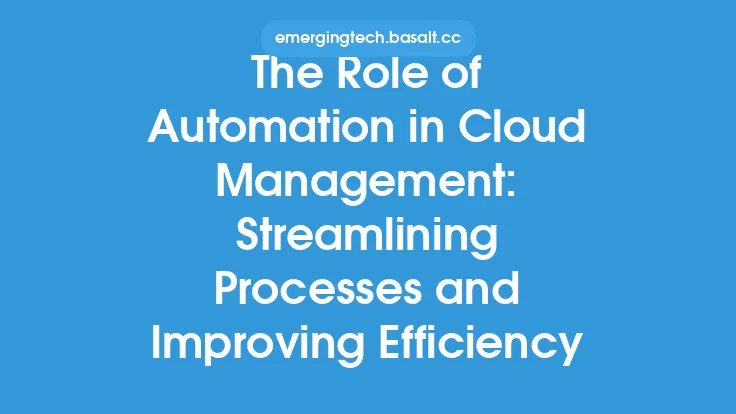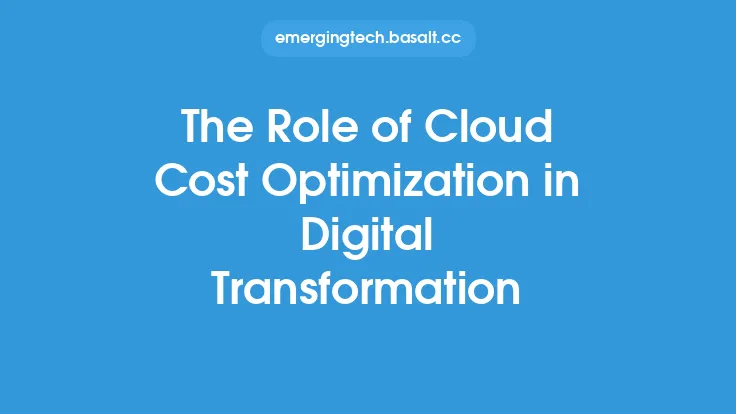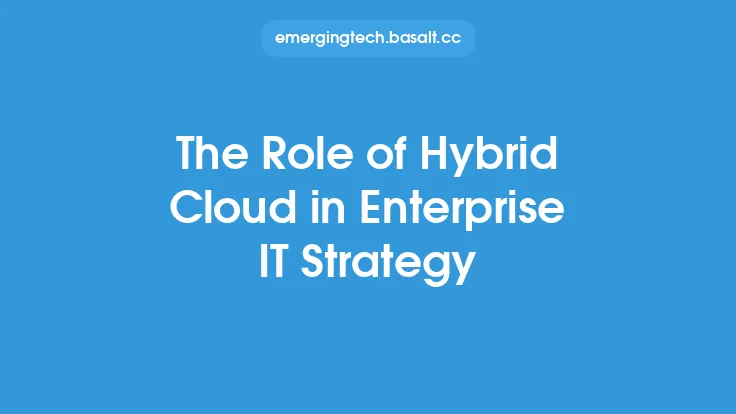The financial services industry has undergone significant transformations in recent years, driven in large part by advances in technology. One area that has seen substantial growth and innovation is wealth management, where technology is being leveraged to improve the efficiency, scalability, and effectiveness of investment management and financial planning. At the heart of this transformation is cloud computing, a model of delivering computing services over the internet, which has revolutionized the way wealth management firms operate, interact with clients, and manage assets.
Introduction to Cloud Computing in Wealth Management
Cloud computing provides on-demand access to a shared pool of computing resources, such as servers, storage, databases, software, and applications, allowing for rapid deployment, flexibility, and scalability. For wealth management firms, this means they can quickly scale up or down to meet changing business needs without having to invest in new hardware or software. Cloud computing also enables secure, remote access to data and applications, facilitating collaboration among financial advisors, portfolio managers, and other stakeholders. This accessibility is particularly beneficial for wealth management, where timely and informed decision-making is crucial.
Benefits of Cloud Computing in Wealth Management
The adoption of cloud computing in wealth management offers several key benefits. Firstly, it enhances scalability, allowing firms to easily accommodate growing client bases or expanding service offerings without the need for significant upfront investments in IT infrastructure. Secondly, cloud computing improves data security and compliance, as reputable cloud service providers invest heavily in robust security measures and adhere to stringent regulatory standards, thereby protecting sensitive client information. Thirdly, it facilitates cost savings by shifting from a capital expenditure model (where firms purchase and maintain their own hardware and software) to an operational expenditure model (where costs are based on actual usage), making it more predictable and manageable. Lastly, cloud computing enables the rapid deployment of new technologies and applications, such as data analytics and artificial intelligence tools, which can significantly enhance investment strategies and client service capabilities.
Technical Aspects of Cloud Computing in Wealth Management
From a technical standpoint, cloud computing in wealth management involves the use of various cloud service models, including Infrastructure as a Service (IaaS), Platform as a Service (PaaS), and Software as a Service (SaaS). IaaS provides virtualized computing resources over the internet, allowing firms to manage their own applications and data. PaaS offers a complete platform for developing, running, and managing applications, without the need for underlying infrastructure management. SaaS, on the other hand, delivers software applications over the internet, eliminating the need for local installation and maintenance. Wealth management firms can choose the model that best fits their needs, or they can adopt a hybrid approach, combining different models to achieve greater flexibility and efficiency.
Implementation and Integration of Cloud Computing
Implementing cloud computing in wealth management requires careful planning and execution. Firms must assess their current IT infrastructure, applications, and data to determine the best approach for migration to the cloud. This involves evaluating the compatibility of existing systems with cloud platforms, ensuring data security and integrity during the transition, and training staff on new cloud-based applications and services. Integration with existing systems and third-party services is also crucial, as wealth management firms often rely on a variety of software and data providers for functions such as portfolio management, risk analysis, and client relationship management. Successful integration enables seamless data flow, enhances operational efficiency, and supports more informed investment decisions.
Security and Compliance in Cloud Computing for Wealth Management
Security and compliance are paramount in wealth management, given the sensitive nature of client data and the strict regulatory environment. Cloud computing providers must adhere to industry standards for data encryption, access controls, and auditing, ensuring that client information is protected against unauthorized access or breaches. Wealth management firms should also conduct thorough due diligence on potential cloud service providers, evaluating their security protocols, compliance certifications (such as SOC 1 and SOC 2), and track record of maintaining data integrity. Additionally, firms must ensure that their cloud computing solutions comply with relevant financial regulations, such as the General Data Protection Regulation (GDPR) in the European Union and the Gramm-Leach-Bliley Act (GLBA) in the United States.
Future of Cloud Computing in Wealth Management
The future of cloud computing in wealth management is promising, with ongoing advancements in technology expected to further enhance the efficiency, scalability, and innovation of financial services. The integration of emerging technologies like artificial intelligence, blockchain, and the Internet of Things (IoT) with cloud computing will likely play a significant role in shaping the future of wealth management. These technologies can enable more sophisticated investment analysis, personalized client services, and real-time portfolio monitoring, among other benefits. As the wealth management industry continues to evolve, the adoption of cloud computing and associated technologies will be critical for firms seeking to remain competitive, improve client outcomes, and navigate the complex regulatory landscape.
Conclusion
Cloud computing has become a cornerstone of modern wealth management, offering a flexible, secure, and scalable platform for managing client assets, analyzing investment opportunities, and delivering personalized financial services. By understanding the benefits, technical aspects, implementation considerations, security requirements, and future potential of cloud computing, wealth management firms can harness the power of this technology to drive growth, improve efficiency, and enhance client satisfaction. As the financial services industry continues to digitize and evolve, the role of cloud computing in wealth management will only continue to grow, enabling firms to innovate, adapt, and thrive in an increasingly competitive and regulated environment.





